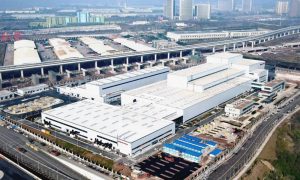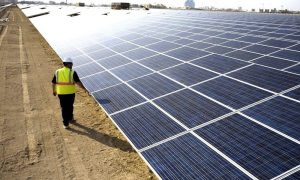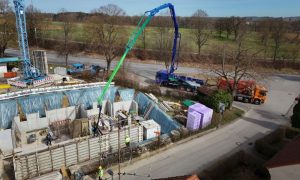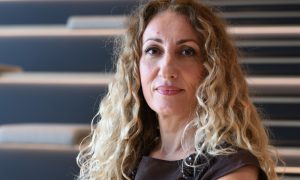Trend Setter
Big Project Middle East talks to Joerg Scheifler, CEO of Infrastructures and Cities Sector Middle East at Siemens, about how his company’s work is helping Qatar show the way forward in the GCC
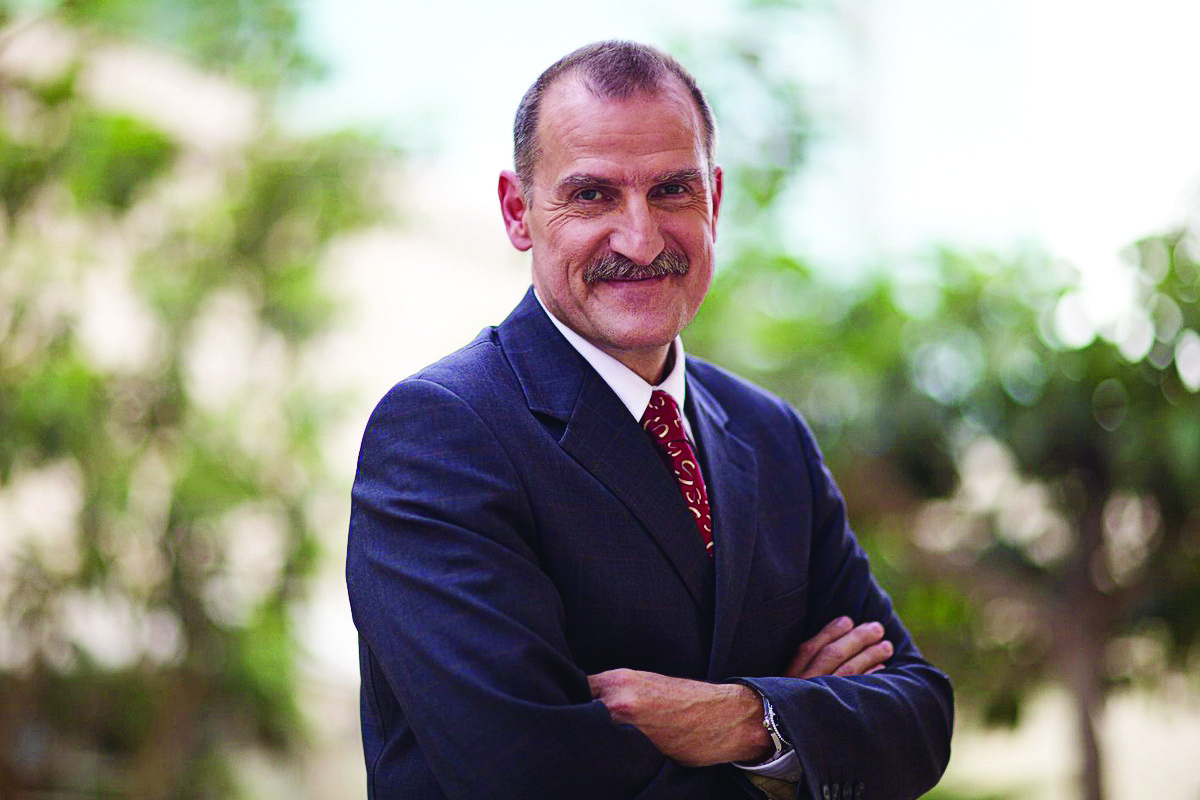
Ever since Sepp Blatter announced that Qatar would be the host nation for the 2022 FIFA World Cup, there’s been almost incessant talk about the construction and infrastructure development opportunities available in the nation with the world’s third-largest natural gas reserves.
Contractors, consultants and manufacturers have been falling over themselves to get into the Gulf Arab state ahead of each other and carve out a slice of the pie. And what a pie it is too, with a 2012 Commercial Bank of Qatar report predicting that the Qatar construction sector will be worth as much as $210 billion by 2020.
With roads, infrastructure, stadiums, transport networks and high rise towers all on the agenda, it’s clear that Qatar has arrived on the regional construction scene, and that it would be foolish for a construction firm to ignore the opportunity it offers.
One company that recognised this tiny country’s potential was the German global powerhouse, Siemens AG. Since the 1970’s the company has been involved in Qatar’s development on a project by project basis, despite not having a permanent set up in the country.
In 2005, that changed as Siemens WLL was set up, and to date, they now have 400 people working full time for the company, with plans to grow further well underway.
This investment into the country has paid off handsomely for the company, with its Infrastructure and Cities Sector handed the reins for a defining transportation project for Qatar, the Doha Tram system. In addition, the sector focuses on five core divisions – rail, mobility solutions, smart grid solutions, low and medium voltage solutions and building technologies.
Joerg Scheifler is the CEO of Infrastructure and Cities Sector in the Middle East and the man tasked to oversee the tram project, along with the sector’s activities in 16 countries across the region.
“We’re basically delivering a turnkey project with a three-digit-million US dollar volume. We are in a consortium with the well known construction company Leighton, who are our civil partner,” he tells Big Project ME during an exclusive interview.
“We’re currently in the execution phase, and it’s going well so far. We’re in regular contact with the end-customer, Qatar Foundation, and its project execution arm, which is ASTAD. We’re currently in the design phase so everything is going fine; the delivery date is August 2015, when we will deliver our Avenio trams.”
“The total track length is 11.5km, and we’ll have 25 stations. It’s a technical first. It’s the first tram in the Middle East without any visible overhead lines, so that’s something that will differentiate Qatar from other countries with (tram systems),” he outlines.
Appointed in January 2012, Scheifler has extensive experience in the region, having worked in Iraq, Kuwait, Saudi Arabia, Bahrain and the UAE for more than 30 years prior to taking over in Qatar.
He says that his main focus is to support the country by providing solutions as it looks to show the way forward for the rest of the GCC.
“We are, I would say, lucky to find a customer that is so progressive. The good thing is that the Qatar Foundation is always looking for the best and they do not shy away from being the first in certain areas,” he enthuses.
“Generally, for me, Qatar is a trend-setter. If you compare it with other countries in the GCC, it is leading in many different areas. In other words, whatever we do here in Qatar, we can nicely replicate in other countries in the region, for example in Saudi Arabia or the UAE.”
“But Qatar, at the moment, is definitely the powerhouse. I would say that maybe besides Saudi Arabia, they’re the most focused on steaming ahead with their infrastructure development,” Scheifler reiterates strongly.
Driving this progressiveness has been Qatar’s leadership, through the Qatar Foundation, which has been pushing for more sustainable solutions, he says.
“Qatar is one of the most progressive countries in the region in terms of infrastructure development, and hence our sustainable solutions are an ideal fit for the country.”
“It always makes sense to talk to these institutions also contract independent and tell them what we’re doing in R&D and inform them about the latest trends in sustainability,” he says.
This is a refreshing change from the status quo, where any talk of sustainability is confronted with resistance over costs and effectiveness.
With massive development on the agenda, the future looks bright for construction in Qatar, and Scheifler says that he expects Siemens and the Infrastructures and Cities Sector to be right at the forefront of the charge.
“There are a lot of projects coming up here, especially in relation to the project development leading up to the World Cup 2022,” he says.
“Big event-related and non-event related projects, so there’s quite a big basket out there, especially the big rail related projects in Qatar.”
“The Metro Doha, the tram, they’re also talking about a high-speed train network. Definitely the biggest opportunities can be found in the rail transport sector,” he says, adding that the Doha Metro project is, in his view, one of the most exciting developments in the country.
This isn’t just because of what it would mean for Qatar, but also because of the wider implications in the GCC. With plans for a region-wide railway network gathering steam, the building of projects like the Doha Metro is a precursor to a network that could stretch from Kuwait to Oman. It is a vision that Scheifler is an advocate of and one that he believes will have a massive impact.
“In terms of the GCC network, this is of course the most interesting concept out there,” he says.
“Overarching, it basically includes all the GCC countries, so definitely we’re not the only player who wants to play a role in that,” he asserts, “(But) I think it’s a great vision, it brings these countries together and to be honest, it wouldn’t be the first time that people are thinking along these lines.
“We also have the GCC grid, which is also very much advanced in its installation and implementation. I definitely compare the two, because if you can create a GCC grid, why shouldn’t you be able to create a GCC rail network, so I see a lot of similarities in that.”
While the rail sector is of vital importance, Scheifler says that attention is also being given to a number of other projects in Qatar, with sustainability and building technology all on the agenda.
As part of this, the Infrastructures and Cities Sector has been involved in the development of a ‘smart-grid’ project for the country, which again highlights Qatar’s willingness to try new things, he says, pointing out the Gulf Arab country’s record over the years.
“We’re doing currently a project for installing around 17,000 smart meters and 15,000 water meters, along with a meter management software. This pilot project is actually also the first of its kind in the Gulf at least. It is going to set the trend as to how one ideally manages customer demand during peak periods, improve the billing process with the end user, and so on,” he explains.
“Furthermore, another area which we’re involved in, it’s not exactly Infrastructure and Cities, but it belongs to the whole Siemens’ portfolio, is currently our massive involvement in the energy distribution field. The Kahramaa Phase 10, where we’re currently in the execution of quite a number of substations.”
As these projects continue to grow and gather pace, Scheifler says that he’s excited about the opportunities available in the country, and he hopes they’ll be adopted throughout the GCC as their success is proven.
“This is why I said before that, for me, Qatar is really about trend-setting. They have more and more demands for sustainable solutions and we’re happy to deliver that. There are other countries out there that are not thinking along these lines, and you know, if you have such customers, you can preach whatever you want about sustainability, they don’t want to buy it.”
Although he is quick to clarify that the UAE, Saudi Arabia and the rest of the GCC are just as important to Siemens, he holds out hope that Qatar will become the standard by which the region will be judged when it comes to sustainability.
“We do a lot in terms of sustainability as well in the UAE, Siemens is always looking for new opportunities, (however) I do see a bright future here in Qatar.”




